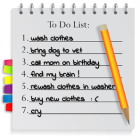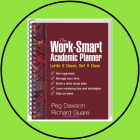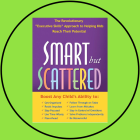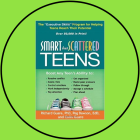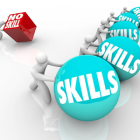Tag Archives:executive functioning
ADHD is Different For Women share
 When it comes to Attention Deficit Hyperactivity Disorder (ADHD), it’s important to know that there are three different “subtypes” of ADHD and that, to be diagnosed with ADHD, you only need to fit into one of the three types. People can have just the predominantly inattentive type, the predominantly hyperactive/impulsive type, or the combined type. However, the average person tends to think that a person is required to have hyperactivity symptoms in order to be diagnosed with ADHD. For this reason, as Maria Yagoda describes in her article, ADHD is Different for Women, girls and women with ADHD, who often don’t exhibit hyperactivity, tend to go undiagnosed. Her easy-to-read article is a lovely blend of personal anecdote and research-based information, with some other resources to check out, if you are interested. So, if you (or someone you care about) are of the female persuasion and tend to find yourself constantly overwhelmed by the day to day details in life that others seem to pull off without a hitch, I suggest that you give this article a read.
When it comes to Attention Deficit Hyperactivity Disorder (ADHD), it’s important to know that there are three different “subtypes” of ADHD and that, to be diagnosed with ADHD, you only need to fit into one of the three types. People can have just the predominantly inattentive type, the predominantly hyperactive/impulsive type, or the combined type. However, the average person tends to think that a person is required to have hyperactivity symptoms in order to be diagnosed with ADHD. For this reason, as Maria Yagoda describes in her article, ADHD is Different for Women, girls and women with ADHD, who often don’t exhibit hyperactivity, tend to go undiagnosed. Her easy-to-read article is a lovely blend of personal anecdote and research-based information, with some other resources to check out, if you are interested. So, if you (or someone you care about) are of the female persuasion and tend to find yourself constantly overwhelmed by the day to day details in life that others seem to pull off without a hitch, I suggest that you give this article a read.
Executive Functioning Skills share
What are these skills you speak of?
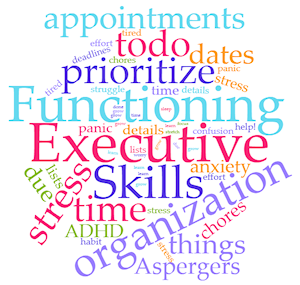 “Executive functioning skills” is a term that is used to describe our brain’s ability to plan, organize, and complete tasks. Brain functions such as short-term memory, mental flexibility, and self-control are all involved in these types of tasks. In your day to day life, this means that you are capable of developing strong executive functioning skills if your brain does well with remembering, being able to shift gears or “think outside of the box,” and being self-aware enough to enable you to control impulses and adjust your actions when change is helpful. If you are lucky enough to have strong executive functioning skills you will more easily develop the ability to:
“Executive functioning skills” is a term that is used to describe our brain’s ability to plan, organize, and complete tasks. Brain functions such as short-term memory, mental flexibility, and self-control are all involved in these types of tasks. In your day to day life, this means that you are capable of developing strong executive functioning skills if your brain does well with remembering, being able to shift gears or “think outside of the box,” and being self-aware enough to enable you to control impulses and adjust your actions when change is helpful. If you are lucky enough to have strong executive functioning skills you will more easily develop the ability to:
- Find things when you need them rather than spending half of your planned task activity just trying to locate the items that you need.
- Keep track of tasks that need to get taken care of or appointments/dates to keep instead of constantly needing to apologize for forgetting to do things or show up when you promised to.
- Prioritize things that are the most important over accomplishing other perhaps the easier ones…or the ones that are less tedious…or the ones that just happen to be in front of your face (I call these rabbit holes…a major weakness of mine, I go down rabbit holes all the time. My professional husband also uses the term, “project creep” when he is encouraging me to avoid it and stay on task. ).
- Chunk/plan out long term projects so that you can gather the necessary materials and then work on them gradually rather than leaving it all to the last minute.
- Estimate how long a task will take, fairly accurately, so that as you plan things in your schedule or on your “To Do” list, you have reasonable expectations of yourself rather than expecting yourself to have 8 hands and 2 brains and then feel like a failure when you don’t accomplish everything on your list.
The Work-Smart Academic Planner: Write It Down, Get It Done by Peg Dawson EdD & Richard Guare PhD share
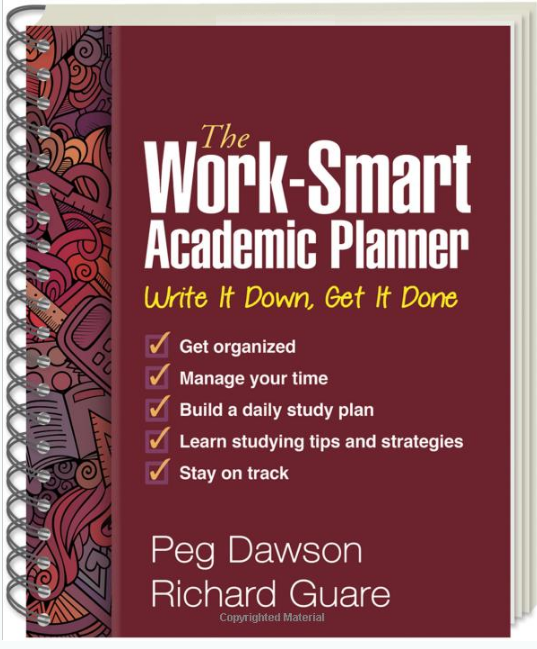 A review of this is yet to come. I have ordered my copy… just learned that this planner exists! Amazon reports that it’s geared to kids in 6-12th grades. These authors have two other books that I recommend, Smart but Scattered & Smart But Scattered Teens. The authors’ do a great job of making things understandable in a way that doesn’t leave the reader feeling stupid. When you struggle with these skills, it can be easy to get down on yourself. These authors can do a great job of pulling you back up to feeling like you are smart and capable. So, this letter might be worth having.
A review of this is yet to come. I have ordered my copy… just learned that this planner exists! Amazon reports that it’s geared to kids in 6-12th grades. These authors have two other books that I recommend, Smart but Scattered & Smart But Scattered Teens. The authors’ do a great job of making things understandable in a way that doesn’t leave the reader feeling stupid. When you struggle with these skills, it can be easy to get down on yourself. These authors can do a great job of pulling you back up to feeling like you are smart and capable. So, this letter might be worth having.
* I don’t make any money from the books that I recommend. My reviews are solely based on wanting to let people know what’s out there and could be helpful to them.
Smart But Scattered by Peg Dawson, EdD & Richard Guare, PhD share
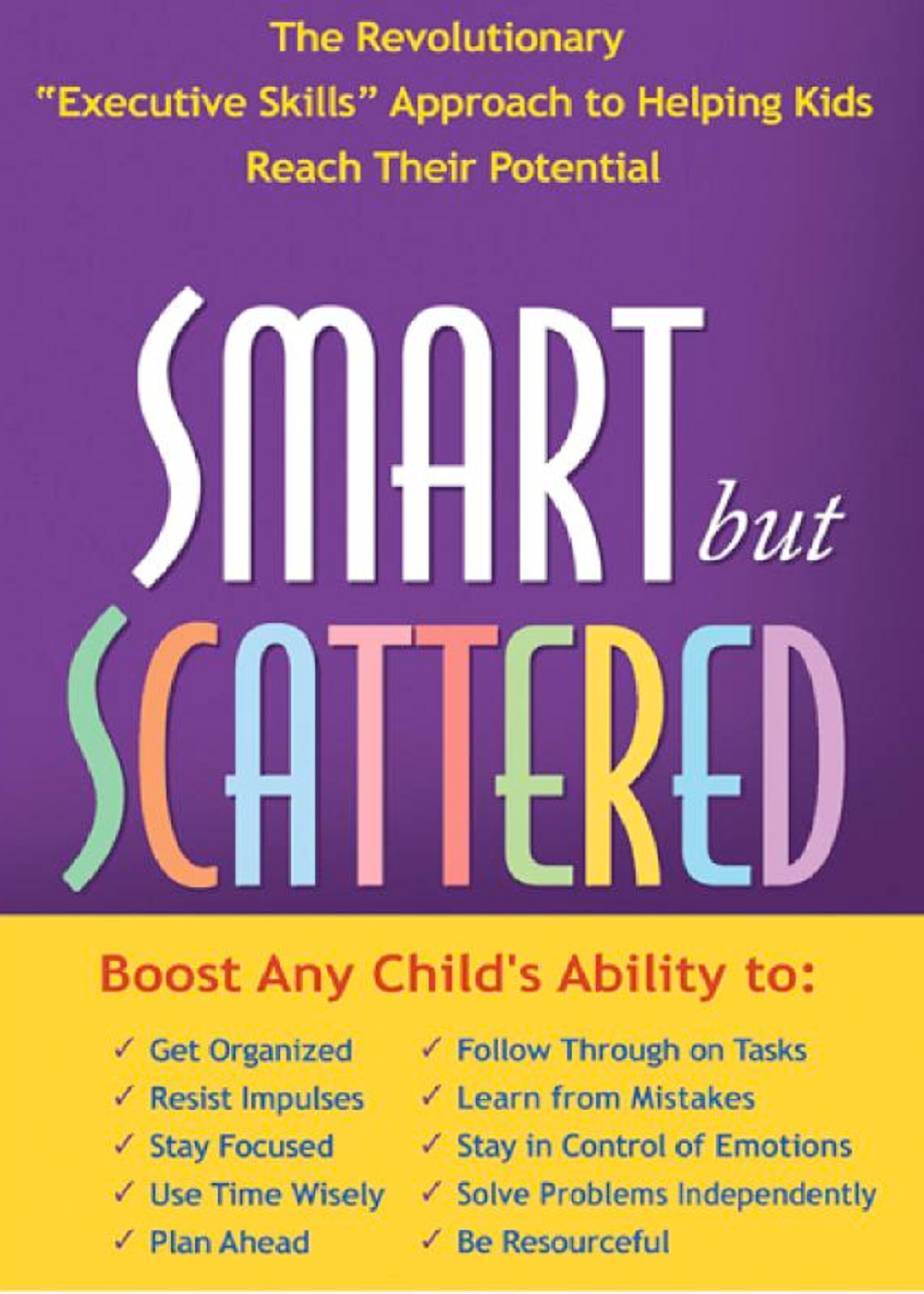 While I own this book, I have not had a chance to give it a read. It is geared towards parents of 4-13 year-old kids. You can check out my review of their companion book, Smart but Scattered Teens, which I suspect is pretty similar to this one. Additionally, in creating this review, I was excited to learn that they now have a Work-Smart Academic Planner that I will be reviewing as soon as I get my hands on a copy!
While I own this book, I have not had a chance to give it a read. It is geared towards parents of 4-13 year-old kids. You can check out my review of their companion book, Smart but Scattered Teens, which I suspect is pretty similar to this one. Additionally, in creating this review, I was excited to learn that they now have a Work-Smart Academic Planner that I will be reviewing as soon as I get my hands on a copy!
* I don’t make any money from the books that I recommend. My reviews are solely based on wanting to let people know what’s out there and could be helpful to them.
Smart But Scattered Teens by Richard Guare, PhD, Peg Dawson, EdD, and Colin Guare share
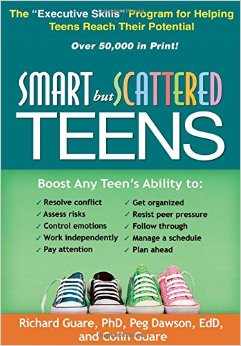 With a sense of humor and practicality, the authors of this book provide concrete, step-by-step ways to take a look at your teen’s (and yours!) strengths and weaknesses in terms of organization and planning. They then provide information about how people’s brains work and how having “executive functioning” challenges effects people’s day-to-day lives. They guide you through ways to improve these types skills with respect and compassion. The thing I like most about this book is that they emphasize that people with very smart brains can struggle with these skills. Geared to the 13 and up crowd, they also have companion books for younger kids (Smart but Scattered) as well as a new, Work-Smart Academic Planner that I’m excited to be checking out!
With a sense of humor and practicality, the authors of this book provide concrete, step-by-step ways to take a look at your teen’s (and yours!) strengths and weaknesses in terms of organization and planning. They then provide information about how people’s brains work and how having “executive functioning” challenges effects people’s day-to-day lives. They guide you through ways to improve these types skills with respect and compassion. The thing I like most about this book is that they emphasize that people with very smart brains can struggle with these skills. Geared to the 13 and up crowd, they also have companion books for younger kids (Smart but Scattered) as well as a new, Work-Smart Academic Planner that I’m excited to be checking out!
* I don’t make any money from the books that I recommend. My reviews are solely based on wanting to let people know what’s out there and could be helpful to them.
Emotionally Intelligent Life Skills share
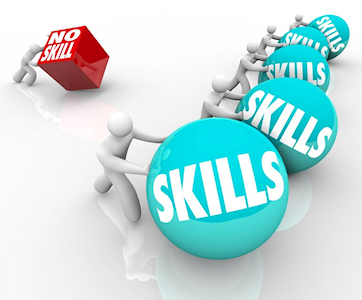 There are several types of skills that are worth working on because, as we all get better at them, they help us have less conflict and difficulty in our lives and increase the possibility that other people understand our thoughts and feelings. And the more often that happens, the more likely we are to experience our day to day life as happy. For example, Executive Functioning Skills help us to be organized so that we take care of the things we need to and help us to feel more responsible and in control of our lives. Mindfulness Skills help us to find pleasures in the small moments in life that are happening around us all of the time. They help us worry less and be happy more. Relaxation Skills, mindfulness being one of them, help us to calm anger and reduce panic and worry. Social Skills help us to work well in groups, create/deepen/maintain friendships and loving relationships, and increase the chances of other people having good/comfortable thoughts about us. Anger Management and Conflict Resolution Skills help us to not let our emotions create bigger problems for us than we already have and help us to solve problems in ways that encourage people to have good/comfortable thoughts about us.
There are several types of skills that are worth working on because, as we all get better at them, they help us have less conflict and difficulty in our lives and increase the possibility that other people understand our thoughts and feelings. And the more often that happens, the more likely we are to experience our day to day life as happy. For example, Executive Functioning Skills help us to be organized so that we take care of the things we need to and help us to feel more responsible and in control of our lives. Mindfulness Skills help us to find pleasures in the small moments in life that are happening around us all of the time. They help us worry less and be happy more. Relaxation Skills, mindfulness being one of them, help us to calm anger and reduce panic and worry. Social Skills help us to work well in groups, create/deepen/maintain friendships and loving relationships, and increase the chances of other people having good/comfortable thoughts about us. Anger Management and Conflict Resolution Skills help us to not let our emotions create bigger problems for us than we already have and help us to solve problems in ways that encourage people to have good/comfortable thoughts about us.
These are all skills that we start to learn as kids but that we continue to hone as adults. And, just like working out makes your muscles strong and makes it easier to do physical things , the more we practice these valuable life skills the stronger our life skills become and the easier it is to positively manage emotional things. Study after study shows that creating habits by practicing something over and over again reinforces neural pathways in our brains and results in “habits.” This means that the more we practice and flex our emotional muscles, the easier these skills become for us. So get out there and learn some new skills or just keep practicing the ones that you have already learned about. It pays off!!


